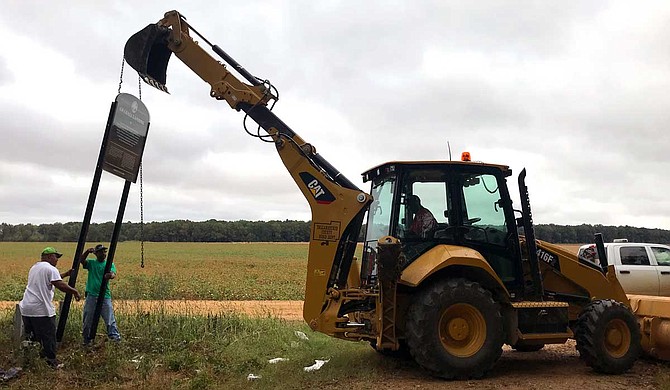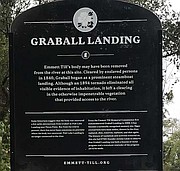(The Emmett Till Memorial Commission placed the sign) there to commemorate his life and legacy. The new sign is the fourth to replace others that were vandalized. For many in our society who question the process of racial healing and reconciliation in America, we should consider why a bulletproof memorial is needed to protect the legacy of Emmett Till. Photo courtesy Emmett Till Memorial Commission
One of the most important years in American history was 1955. 1955 was when Emmett Louis Till's mother Mamie Till Mobley made a bold step by having an open-casket funeral to show the world what had happened to her son in Mississippi. The 14-year-old boy from Chicago was visiting his family in Money, Miss., during the summer of 1955 when he allegedly whistled at and grabbed the hand of Carolyn Bryant Donham, a white woman. This event was part of what led to his death. Donham, now 85 years old, has since admitted that part of her story was a lie and nothing that young boy did deserved what happened to him.
Mississippi is not what it used to be. And yet here we are again, facing the news that Emmett Till's sign that marks the place of his death has been replaced with a bulletproof glass to protect the new sign from being vandalized. (The Emmett Till Memorial Commission placed the sign) there to commemorate his life and legacy. The new sign is the fourth to replace others that were vandalized. For many in our society who question the process of racial healing and reconciliation in America, we should consider why a bulletproof memorial is needed to protect the legacy of Emmett Till. This shows that as much progress that has been made there are forces in America that want to take us back to the racist lynchings many experienced in 1955.
This past weekend, the family of Emmett Till stood on the banks of the Tallahatchie River miles outside of Glendora, Mississippi where Emmett Till's body was found days after he was kidnapped, tortured, and lynched 64 years ago.
The story of Emmett's murder in Mississippi in 1955 is horrific, and it's a constant reminder of the intense and vicious hatred toward African Americans. I often speak on the changes in my home state of Mississippi, and how a state that was once known as the deadliest place for blacks has transformed through racial progress.
It is a damn shame that we are still dealing with incidents like this in 2019. Those bullet holes in Emmett Till's marker are representative of the hate that still exists in the hearts of some Americans. I am grateful that now the sign is bulletproof, however, the protective glass will not change the hearts of many Americans who embody hate towards the African American community. When incidents like these happen, we are placated by those who inhabit our church pulpits, as they tell us that one day, things are going to get better. I don't believe in standing by, waiting for things to magically improve. As an activist, I believe in using my voice and platform to force change. I often quote Congressman John Lewis when he said, "Get in the way and make some noise for change."
A bulletproof sign means nothing without justice for Emmett Till and his family. It means nothing if we don't use our circles of influence to help bring about racial healing. Sixty-four years later, the precise details of Till's case continue to remain unsolved. Will a bulletproof sign change the hearts of many Americans? Will there ever be justice for Emmett Louis Till? The department of justice announced in July of 2018 that it was reopening the Till investigation due to new information the agency received. It's been a year since this announcement, and the department has been silent. It reminds me of many lawmakers who refuse to call out racism, yet demand we unite as a country.
So, to answer my question earlier, will a bulletproof sign change the hearts of many Americans? My answer is "No!" Our actions as a country suggest we have not changed. This dark spot in our history is painful enough to reflect on, but to have our lawmakers and justice department remain silent is even more painful. Justice for Emmett Louis Till is not a black issue. This fight for justice transcends race. It's a call for us to show the world through action that no one is above the law and justice is for all in America. We can no longer remain silent.
Duvalier J. Malone, a native of Fayette, Miss., lives in Washington, D.C. He is the author of "Those Who Give A Damn: A Manual for Making a Difference" and is the chief executive officer and founder of Duvalier Malone Enterprises.




